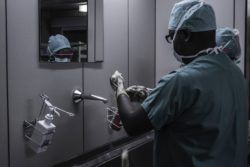By Steve Gulati, Director of Elizabeth Garrett Anderson Programme School of Social Policy, University of Birmingham “The story of the NHS can be viewed through many lenses, those of social history, economic migration and political struggle, and also more personal stories of love, hope, fear and loss.” The 72nd birthday of the NHS is a … Continue reading “Migration, identity and belonging: people of colour and the NHS”
Building a fairer country after the pandemic? It’s time for the return of the council house
By Liam O’Farrell, Research Associate, City-REDI, University of Birmingham “We are now in a situation where many young people can no longer get onto the housing ladder… [and] those in low paid jobs, doing what is now more widely recognised as essential work, often can’t even afford to live near the places they work.” Even … Continue reading “Building a fairer country after the pandemic? It’s time for the return of the council house”
Culturally competent? What does the pandemic tell us?
By Zhu Hua, FAcSS, Professor of Educational Linguistics & Director of the Mosaic Group for Research on Multilingualism, School of Education, University of Birmingham “Seeing cultural competence as a responsibility of those providing health and education programmes is certainly a step in the right direction.” Public Health England’s recent report, Beyond the data: Understanding the … Continue reading “Culturally competent? What does the pandemic tell us?”
All work and no play? Why children need play during Covid-19
By Dr Anita Soni, Academic and professional tutor, School of Education, University of Birmingham and Oliver Wilson, Head Teacher, Woodhouse Primary School (and University of Birmingham ITE alumnus). “For younger children, it is essential that families don’t ignore play, but actively encourage it. While older children can usually socialise online with their friends, via a … Continue reading “All work and no play? Why children need play during Covid-19”
Carers and COVID-19: Hunger and mental health
By Dr Matthew Bennett, Department of Social Policy, Sociology and Criminology School of Social Policy, University of Birmingham “We’ve been clapping for carers throughout the pandemic. The profile of carers has risen. Yet a number of them are silently facing unthinkable hardships.” Did you clap for our carers? Despite their recently raised profile, our … Continue reading “Carers and COVID-19: Hunger and mental health”
Under pressure: Children and Young People’s Mental Health, the hidden impacts of COVID-19
By Dr Gemma McKenna, Health Services Management Fellow School of Social Policy, University of Birmingham Originally posted as a blog piece for The Voice of UK Health Services Research (HSR UK). On the 18th March 2020, schools across the UK closed their doors. Children said goodbye to their teachers and friends, some for the … Continue reading “Under pressure: Children and Young People’s Mental Health, the hidden impacts of COVID-19”
Business as usual? Race, white privilege and COVID-19
By Professor Kalwant Bhopal, Professor of Education and Social Justice & Director of the Centre for Research on Race and Education, University of Birmingham “If we are serious about addressing such inequalities and how white privilege works, we must look to improving the lives of BME communities…” Recent figures released from the ONS suggest … Continue reading “Business as usual? Race, white privilege and COVID-19”
Constructing a new reality: leadership lessons from other times of crisis
By Dr Madeleine Findon, Lecturer in Educational Leadership School of Education, University of Birmingham “…society must ensure that educational leaders are supported to be crisis-responsive by providing the preparation, resources and support they need to ensure their settings survive, then thrive as we construct the new reality together.” The longer the lockdown lasts, the further … Continue reading “Constructing a new reality: leadership lessons from other times of crisis”
How long will we comply with COVID lockdown? 3 tests for legitimate rules
By Dr Claire Mcloughlin & Professor David Hudson International Development Department, University of Birmingham “People are more likely to comply with rules that don’t benefit them if they have some basis in shared values and beliefs and fairness.” Across the world, citizens are facing extraordinary limits on their livelihoods and freedom of association. But as … Continue reading “How long will we comply with COVID lockdown? 3 tests for legitimate rules”
Character in a time of crisis
By Benjamin Miller, Research Fellow Jubilee Centre for Character & Virtues, University of Birmingham “For many teachers, the coronavirus crisis has been a reminder that a holistic education can encompass both the formation of character and the very best academic standards.” The theme for Mental Health Awareness Week this year is kindness. Throughout the week, … Continue reading “Character in a time of crisis”











